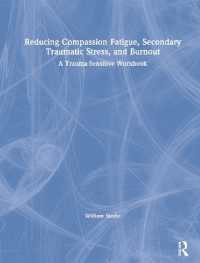- ホーム
- > 洋書
- > 英文書
- > Religion / Ethics
Full Description
A Universal Art. Hebrew Grammar Across Disciplines and Faiths reflects on medieval and early modern Hebrew linguistics as a discipline that crossed geographic and religious borders and linked up with a plethora of scholarly activities, from Judaeo-Arabic Bible translations to the Renaissance search for the holiest alphabet. This collection of articles presents a cross-section of new research avenues on Hebraism, Karaite, Rabbanite and Christian, with an emphasis on the transmission of linguistic ideas through time and space among different communities, cultures and religious currents. The resulting picture is one of intrinsic variation and dynamic growth as opposed to the linear paradigm of development, culmination and stagnation current in the historiography of Hebrew linguistics.
Contents
Introduction: Paradigms We Live By Irene E. Zwiep
I. INDIGENOUS TRADITIONS OF HEBREW LINGUISTICS
a. Theories and Practices of Linguistic Analysis
Geoffrey Khan, The medieval Karaite tradition of Hebrew grammar
José Martínez Delgado, Morphology versus meaning: biblical mixed roots and Andalusian Hebrew lexicographical theories
Ronny Vollandt, Whether to capture form or meaning: a typology of early Judaeo-Arabic Pentateuch translations
Irene E. Zwiep, The impact of teytsh on diqduq, or: why the metaphor became a noun in early modern Ashkenazi linguistics
b. Development of Hebrew Terminology
Judith Kogel, Towards a 'mapping' of the Hebrew grammatical terminology of the Middle Ages: a history of transmission
Ilana Wartenberg, The birth of the medieval Hebrew mathematical language as manifest in Ibn al-Aḥdab Epistle of the Number
II. THE LEGACY OF MEDIEVAL HEBREW LINGUISTICS
a. Jewish Modes of Preservation and Transmission
Mauro Perani, Fragments of linguistic works from the Italian Geniza
Stefan C. Reif, Another glance at a gifted grammarian: more on Shabbethai Sofer of Przemysl
b. Crossing Faiths, Crossing Disciplines
Judith Olszowy-Schlanger, "With that, you can grasp all the Hebrew language": Hebrew sources of an anonymous Hebrew-Latin grammar from thirteenth-century England
Saverio Campanini, The quest for the holiest alphabet in the Renaissance






